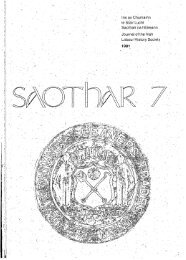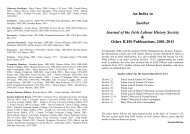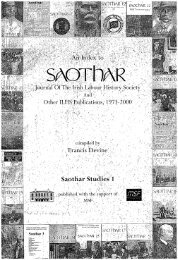56medical profession and the bishops has not been seriouslychallenged and the account recorded here standsas the most authoritative available. His career testifiesthat it is possible to challenge the domination of theHierarchy in Ireland and politically survive with outstandingsuccess.Despite the extreme difficulty of accommodatingBrowne in any political party his election performancesafter 1951 .wereby any.standard quite extraordinary.During that time he has been consistent and courageousin upholding public as against private vested interestsand he remained faithful to his principle of finding thecash means between patient and doctor indefensible.The labour movement especially has lessons to learnfrom the Mother and Child Scheme controversy. Thetwo parties of the Left, Labour and Clann na Poblachtaemerged from the crisis badly, the latter Party beingalmost wiped out of the subsequent election. The essentialpolitical issile was the undermining of the sovereigntyof the Dill by the Hierarchy. All the Dail partiesat the time failed in this respect but the Labour Partymissed an historic opportunity to assert itself as thedefender of that sovereignty. Brownemade a stand andhis political stature rose immeasurably and remainshigh.Joe DeasyAlvah Bessie and Albert Prago (eds), Our Fight -Writings by Veterans ofthe Abraham Lincoln Brigade,Spain, 1936-1939, (Monthly Review Press withthe Veterans of the Abraham Lincoln Brigade, NewYork, 1987), pp. 360, $10Carl Geiser, Pr~oners of the Good Fight - the SpanishCiviLWar, 1936-1939, (Lawrence Hill and Company,Westport, Connecticut, 1986), pp. 298, $12.95Joe Monks, With the Reds in Andalusia, (JohnCornford Poetry Group, London, 1985), pp. 52, £3.95Eoghan 6 Duinnin, La Niiia Bonlta agus an Roisin. Dubh - Culmhni Clnn ar Chogadh Cathartha riaSpalnne, (Clochomhar Tta, Baile Atha Cliath, 1986),pp. 124, £3.00Joseph Donnelly, Charlie Donnelly - The Life andPoems, (Dedalus Press, Dublin, 1987), pp. 93, £4.50Maurice Levine, Cheetham to Cordova - a ManchesterMan of the Thirties, (Neil Richardson, Manchester,1984), pp. 54,£1.75James Yates, Mississippi to Madrid - Memoirs of aBlack American in the Spanish Civil War, (ShamalBooks, New York, 1986), pp. 221, $10Michael O'Riordan, Kolonna Konnolli, (IsdatelstvoPoliticheskoi Literaturi, Moscow, 1987), pp. 254, 80kopeksMax Parker, Al Tocar Diana - Songs from a FrancoPrison - a Reminiscence In Song and Prose, (PolkwaysRecords, New York, 1982), LP record and booklet,pp. 72, $10 .SAOTHAR 13The fiftieth anniversary of the first anti-fascist warthat raged in Spain from 1936 to 1939 has stimulatedrenewed interest in previously published accounts ofthat struggle as well as leading to the publication ofmany new ones. The Connolly Column by Michael0' Riordan remains the standard and most comprehensiveaccount of the 145 Irishmen who fought for theSpanish Republic.! Now as Kolonna Konnolli it hasbeen published in Russian translation, with 60,000copies being distributed throughout the USSR. Someappendices have Deen dropped for this edition, mainlythe reprint of Connolly' s own articles on insurrectionarywarfare and International Brigader Donie 0 'Reilly' syouthful recollections of the 1916 Rising. But theauthor has added some further appendices which aremore informative for the Soviet reader, including oneon Lenin's views on that Rising and another on the draftIrish-Soviet Treaty of 1920.A Russian-language account of the Irish anti-fascistfighters in Spain is indeed a landmark. In view ofthe fact that their leader Prank Ryan was such an ardentGaeilgeoir, an Irish language account is also particularlyappropriate. This need has now been met byEoghan 0 Duinnm with LaNifla Bonita agus an RoisfnDubh. I mbrollach don leabhar ceanna scriobhann EilfsNi Riain go gcuirfeadh se gliondar ar a dearthair,Proinnsias 6 Riain, da mbeadh se boo fos, go bhfuil aleitheid de chuntas ar fail faoi dheireadh, go mormhorle linn comoradh caoga bliain an chogaidh chCanna.Cuimhni cinn pearsanta ata sa leabhar seo agus dabhri sin roghnaionn an t-udar ce hiad na h-Eireannaigha bill sa Bhriogaid Idirnaisiunta gur mian leis a luadhagus re eile nach luaitear in aon chor. Ta iliomadtagairti ann ar nd6igh do laoch faoi leith aige, anRianach fein, agus ni sa Spainne ambain. Ceann de namireanna is suntaisi sa leabhar seo is ea an cur sios athugann an Duinnmeach duinn ar an eite chle i mBaileAtha Cliath le linn na dtriochaidi agus tabhacht anRianaigh mar ceannaire ag an gComhdhail Phoblachtach.Dob'~ an eite chle ceanna d'imigh na h6g1aighEireannacha chun na Spainne, chun an Phoblacht thalla chosaint. Ni hamhain go raibh an Stlit soo againneagus an Eaglais Chaitliceach inan-aghaidh, bill tromlachdaonra na tire fresin agus, nios measa fos, go minic adteaghlaigh fein. Agus an sceal amhlaidh, caithfearaontu gan dabht ar bith le raiteas an udair fein gur'ghniomh dushlanach ag na h-Eireannaigh e an cinneadha rinne siad ar neamh chead do thuairimi nacoitiantachta'. Ni sceallan de ghruaim ata sa leabharseo afach. A mhalairt ata ann, mar ta greann garbh an·udair le feiceail fiu amhain i gcuntas aige ar thrag6idphearsanta. Goineadh Eoghan 6 Duinnm le linn anionsal trasna an Ebro i 1938 agus b'eigean do nadochttiiri cos leis a theascadh ar fad da bharr. Ach se ansuimiu a dheanann se ar an gcailliuint sinna:- 'Peadaima ni, le firinne, go bhfuil cos liom san uaigh'!
REVIEWSJoe Monks was among the earlier Irish anti-fascistvolunteers in Spain who went into action during Christmas1936. His reminiscences, entitled With the Reds inAndalusia, provide a detailed account of the militarysignificance of· that campaign combined with veryvaluable portraits of some of its participants. Again,Frank Ryan looms large and aside from what theaccount reveals of Monks' own background and battleexperiences, the Irish volunteer whose heroism is bestrelated is Frank Edwards. Indeed this is a powerfullyevocative portrait of that Waterford teacher whoseplace in Irish labour history was earned on so manyfronts, with many illustrations of Frank's sharp-tonguedwit.It has taken over fifty years since the death in Spainof Charlie Donnelly for his collected poems to at lastreceive publication. In Charlie Donnelly, the Life andPoems his brother Joseph Donnelly has also broughttogether most, but not all, the tributes to Donnelly fromhis fellow poets - the one from his Republican Congresscolleague· Leslie Daiken being a notable omission.What is particularly valuable about this edition is thatthe collected poems are preceded by a very personalmemoir written by the younger brother which consti~tutes over half of the book. While not sharing hisbrother's politics he nonetheless gives us a very honestinsight into how Charlie Donnelly, coming as he didfrom a comfortable middle class home, became moreand more socially conscious and ultimately involved inthe fight against the oppressive conditions confrontingthe Dublin workirtg-class during the 1930s. When thebook turns to Spain itself the author has performed anexcellent job in drawing on a combination of CharlieDonnelly 's own correspondence and accounts from hisfellow-combatants to provide a very vivid account ofthe course of action which ultimately led to his death atJarama.If Joseph Donnelly's account contains a passingcriticism of some of the military decisions on theRepublican side which resulted in the doomed offensivein which Char lie Donnelly was killed, this is anissue that is gone into with a vengeance in Our FightWritings o/Veterans o/the AbrahamLincolnBrigade.The American volunteer Captain Robert Merriman hadloyally implemented -while vigorousl y protesting-someof these decisions at Jarama. His widow, MarionMerriman Wachtel, who herself fought alongside himin Spain, now recounts that controversy in one of thearticles in this collection of reminiscences. During thecourse of preparing this anthology its first editor AlvahBessie died in 1985 (as we were to lose Joe Monks inJanuary of this year), highlighting the manner in whichtime is now increasingly an enemy in securing a comprehensiverange of accounts from participants in thatanti-fascist struggle. Happily Bessie's successor aseditor, fellow International Brigade veteran Al Prago,was able to bring this particular project to completion.It is indeed a remarkably wide-ranging collection ofAmerican veterans' accounts of the struggle to get toSpain in the first place as well as of successive battleson the various fronts. Given the multi-ethnic characterof the Lincoln volunteers themselves, not to mentionthe International Brigades as such, one would understandablyexpect to fmd something particularly Irishamong such accounts. The Irish-American volunteerPaul Bums has provided a very vivid portrait of SergeantMick Kelly of County G al way, commander of theLincoln Battalion's James Connolly Section. Kellyhad been wounded on the Jarama front the same day asCharlie Donnelly was killed. Despite being certified aspartially disabled, however, he ignored doctors' ordersand returned to front-line combat. 'No doubt the wordwent round in the fascist lines that Michael Kelly wasback', writes Bums, 'hearing which General O'Duffyand his blue-shirted Irish legion slunk ignominiouslyinto the last pages of history'. Not a historicallyverifiable detail of cause and effect, of course, butBums knows that such imagery expresses a deeperhistorical truth. And he ends his tribute with a movingaccount of the death in action at Villanueva de laCanada of the Galwaymanofficially confined to 'dutiesof a clerical nature'. .It was also in the Lincoln Batallion that BlackAmericans achieved the historical breakthrough ofcommanding mixed units, something which had beendenied to them in their own country's army. FromMississippi to Madrid represents the memoirs of JamesYates who narrates how Black volunteers like himself,the grandson of a slave, experienced the Spanish Republicas the first place where they ever felt likefreemen. Yates provides us with a frightening pictureof what it was like to be the child of a Black worker inAmerica's Deep South seventy years ago. Indeed theonly white to come to his family's aid during an attackby a Ku Klux Klan lynching party was a sawmill workerwhom he recalls as follows' He had an unusual way ofspeaking English. I could only catch one or two wordsout of ten ... I often heard him talk about a place I'dnever heard of before - Ireland' .Becoming a worker in the industrial North andjoining the Communist Party, Yates volunteered forSpain. There he would meet many Irish, includingFrank Ryan, and be present at a very special Black-Irishevent during a lull from the fight: 'Among the Blackvolunteers on the medical team, Salaria Kee crossed mypath shortly after she arrived in Spain. She was the onlyBlack nurse to serve in the International Brigades ..,Some time before she was wounded, a young ambulancedriver, John Joseph 0' Reilly from Thurles, CountyTipperary in Ireland, discovered the courageous nurse.He was a member of the Connolly Column. The twowere marrried at Villa Paz, an ancient Bourbon estatepressed into service as a hospital for the Republic'.The diversity of nationalities within the Interna-57
- Page 1 and 2:
JOURNAL OF THE IRISH LABOUR HISTORY
- Page 3 and 4:
ContentsPageEditorial: Labour Histo
- Page 5 and 6:
EDITORIAL 3freedom to participate i
- Page 7 and 8: CorrespondenceThe Irish Labour Part
- Page 9 and 10: ; ~ ; ,The Decline and Fall of Donn
- Page 11 and 12: THE DECLINE AND FALL OF DONNYBROOK
- Page 13 and 14: THE DECLINE AND FALL OF DONNYBROOK
- Page 15 and 16: ·' THE DECLINE AND FALL OF DONNYBR
- Page 17 and 18: THE DECLINE AND FALL OF DONNYBROOK
- Page 19 and 20: THE DECLINE AND FALL OF DONNYBROOK
- Page 21 and 22: THE DECLINE AND FALL OF DONNYBROOK
- Page 23 and 24: THE DECLINE AND FALL OF DONNYBROOK
- Page 25 and 26: ,'-,;-''''.A PASSAGE TO BRITAIN 23C
- Page 27 and 28: A PASSAGE TO BRITAIN 25only in the
- Page 29 and 30: A PASSAGE TO BRITAIN 27clothing._De
- Page 31 and 32: A PASSAGE TO BRITAIN 29established
- Page 33 and 34: ;:-.",.- .. .", ...... '.:. '
- Page 35 and 36: LOUIE BENNETI 33feminist movement w
- Page 37 and 38: :... ~: ."
- Page 39 and 40: -.- '.LOUlE BENNETT 37While there i
- Page 41 and 42: LOUIE ~ENNEIT 39Xl's encyclical Qua
- Page 43 and 44: LOUIE BENNEIT 41Bennett's own relat
- Page 45 and 46: LODIE BENNETT 43109; IWWU resolutio
- Page 47 and 48: Essays in ReviewCosherers, Wanderer
- Page 49 and 50: ••• .".'. >. '~"ESSA YS IN RE
- Page 51 and 52: ESSAYS IN REVIEW 49ConnolIy:Myth an
- Page 53 and 54: ESSAYS IN ~EVIEW 51tion' in the Int
- Page 55 and 56: ESSAYS IN REVIEW53International:'I
- Page 57: REVIEWScontroversy is real history.
- Page 61 and 62: REVIEWSnolly-Column Song','Proudly
- Page 63 and 64: REVIEWSresulting from the arrival o
- Page 65 and 66: REVIEWS,63the book by means of an a
- Page 67 and 68: REVIEWSlogue, it is hardly surprisi
- Page 69 and 70: The Team For All Workers ...CULIAIB
- Page 71 and 72: ESSAYS 69mission and moral refonn.l
- Page 73 and 74: .. ...... ~.~ -~ .'- '.ESSAYS. 71fr
- Page 75 and 76: ESSAYS 73claimed authority but whic
- Page 77 and 78: ESSAYS 75provided the basis for soc
- Page 79 and 80: ESSAYS 779. For comparisons see E.T
- Page 81 and 82: ESSAYS 7952. Annals of Christ Churc
- Page 83 and 84: ESSAYS' 81Fianna Fail and the Worki
- Page 85 and 86: ESSAYS 83Eireann in 1925 visibly di
- Page 87 and 88: ESSAYS 85recognition of the impract
- Page 89 and 90: ESSAYS 871970, it created the condi
- Page 91 and 92: ESSAYS89The Irish Immigrants' Contr
- Page 93 and 94: ESSAYS" 91Although anti -Catholic p
- Page 95 and 96: ESSAYS 93McCowie played a key role
- Page 97 and 98: :. -,,'.' ',. .~.,:.ESSAYS 95Althou
- Page 99 and 100: ESSAYS 97young girl of their own ba
- Page 101 and 102: SourcesIrish Labour History Society
- Page 103 and 104: SOURCES 101INovember, 1971 to no. 1
- Page 105 and 106: SOURCES 103would claim credit for t
- Page 107 and 108: SOURCES105Sources for Irish Labour
- Page 109 and 110:
SOURCES 107NorthWest Archives and L
- Page 111 and 112:
SOURCES 109In 1966 the Finnish gove
- Page 113 and 114:
TURNINGANEWLEAFThe CPSSUis the larg
- Page 115 and 116:
REMINISCENCE 113us due to my politi
- Page 117 and 118:
REMINISCENCE 115when Jim was presen
- Page 119 and 120:
REMINISCENCE 117of Dail Eireann. 17
- Page 121 and 122:
REMINISCENCE 119NotesThe above arti
- Page 123 and 124:
DOCUMENT STUDY 121James Connolly in
- Page 125 and 126:
DOCUMENT STUDY123SOCIAL DEMOCRATIC
- Page 127 and 128:
DOCUMENT STUDY 125proletariat of th
- Page 129 and 130:
DOCUMENT STUDY 127the support of Je
- Page 131 and 132:
DOCUMENT STUDY 12926. The Workers'
- Page 133 and 134:
131BibliographyA Bibliography of Ir
- Page 135 and 136:
BIBLIOGRAPHY 133Compton, P.A. Demog
- Page 137 and 138:
BIBLIOGRAPHY 135Levine, I. and Madd
- Page 139 and 140:
BIBLIOGRAPHY 137Turner, M. 'Towards
- Page 141 and 142:
BIBLIOGRAPHY 1394. Land and Agricul
- Page 143 and 144:
BIBLIOGRAPHY 141Clogher Record12 (2
- Page 145 and 146:
BIBLIOGRAPHY 143Political Research
- Page 147 and 148:
BIBLIOGRAPHY 145Pres, 1987.O'Brien,
- Page 149 and 150:
147Notes on Contributorsf onathanBe
- Page 151 and 152:
1901: Ireland's first general union
- Page 153 and 154:
ELECTRICAL TRADES UNION .Establishe





